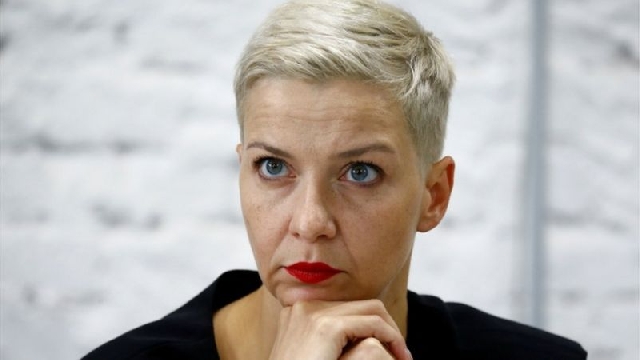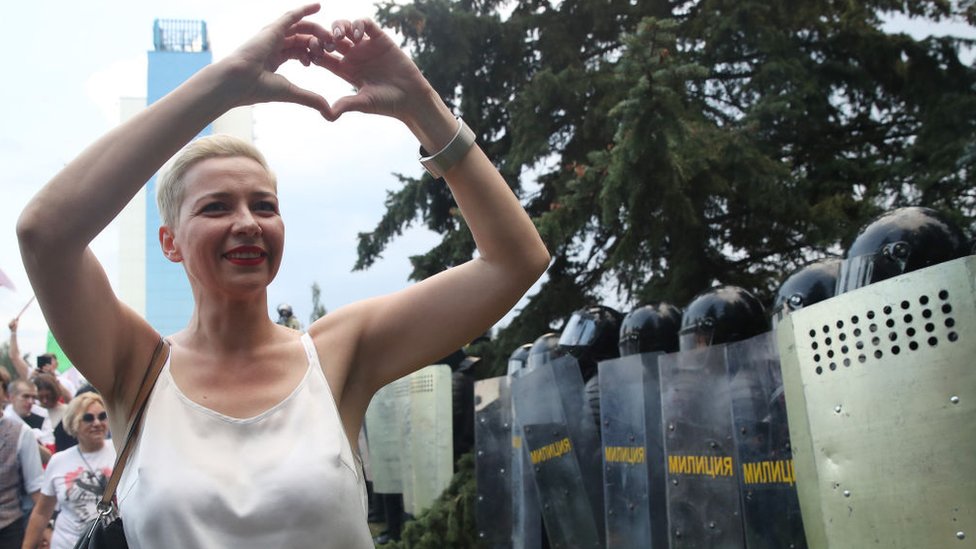Belarus protests – Maria Kolesnikova 'detained by masked men'
 Maria Kolesnikova
Maria Kolesnikova
Unidentified masked men have detained a leading opposition figure in Belarus, according to local media.
Witnesses reportedly saw Maria Kolesnikova being bundled into a minibus in Minsk and driven away. She was one of three women who joined forces ahead of August's presidential election to challenge incumbent Alexander Lukashenko.
Mass unrest has followed his re-election amid allegations of vote-rigging.
The interior ministry said it detained 633 people on Sunday after a fourth consecutive weekend of protests. At least four people have died and hundreds have been injured as authorities have tried to crush dissent in the country.
What's happening in Belarus? 'Breathing freedom' - Belarusians hope for change
EU leaders do not recognise the results of the election and have agreed to impose sanctions on Belarus.
But Mr Lukashenko - who has been in power since 1994 - has blamed Western nations for interfering in his country. On Monday, the Kremlin announced he would visit Moscow for talks "in the coming days".
Russia is a close ally of Mr Lukashenko's. What happened to Maria Kolesnikova? An eyewitness told Belarus news outlet Tut.by that she saw masked men take Ms Kolesnikova's mobile phone and push her into a minibus on Monday morning.
Police in the capital, Minsk, have not yet commented on the reports. Ms Kolesnikova was a member of the Co-ordination Council set up by the opposition to ensure a transfer of power.
Government authorities have launched a criminal case against opposition leaders, saying the "creation and activity of the Co-ordination Council are aimed at the seizure of state power, and at harming national security"  She is the last of the three women who joined forces against Mr Lukashenko to remain inside Belarus.
She is the last of the three women who joined forces against Mr Lukashenko to remain inside Belarus.
Veronika Tsepkalo and presidential candidate Svetlana Tikhanovskaya left the country soon after the vote. "I'm the only one of the three of us who is still here," Ms Kolesnikova told BBC Russian in an interview last month.
"To understand exactly what's going on, you really have to be here." Describing the demonstrations as "not a struggle for power", but "a struggle for human dignity and self-respect", she said she was not afraid for herself, but worried about further violence.
She also said she and her team had decided against using bodyguards because there would be "no point". "I am aware that no number of guards would be of any use if a bus full of riot police stopped us," she said.
"We all know what a police state is capable of." Another female activist, Olga Kovalkova, announced on Saturday she had fled to Poland amid threats of imprisonment.
What happened on Sunday?
Her arrest follows further demonstrations on Sunday - a key day for street demonstrations since the rallies began.
Eyewitnesses told Russia's Interfax news agency that police began to make arrests in Minsk after the unsanctioned rally ended and people were going home. Video footage on Sunday shows men in plain clothes beating peaceful protesters with batons.
The interior ministry confirmed at least 633 arrests had been made across the republic. It said some 363 people had been sent to detention centres pending court hearings.
Internal Affairs Minister Yuri Karayev defended the actions of the security forces. "They talk about the brutality of the Belarusian police, and I want to say this: there are no more humane, restrained and cool-headed police anywhere in the world," he was quoted as saying by the official Belta news agency.
In recent days, the security forces have targeted university students as they returned from their holidays, dragging some from the streets and university buildings into unmarked minivans.
One protester in Minsk, who gave her name as Lyudmila, told the BBC earlier that the demonstrators were undeterred by the security forces. "We are definitely not ready to get back to the life we had for many years now," she said.
"We finally feel like we matter because we've been living in apathy for way too long, and now we just have this feeling of solidarity and we actually think that - well, I feel personally that - changes already are happening, so that's definitely not the time to give up
." Protests have also been reported in other Belarusian cities and towns including Grodno, Mogilev and Gomel.
Source: BBC
Trending World

Gunmen kill nine in South Africa tavern attack
17:54
Trump says US will keep or sell oil seized from Venezuela
17:32
Gunmen abduct 28 Muslim travellers in central Nigeria
16:01
US conducting surveillance flights over Nigeria after Trump intervention threat
04:25
UN experts urge Iran to stop execution of woman activist
17:30
US economy grows at fastest pace in two years
18:28
Brazil's Supreme Court allows Bolsonaro to leave prison for surgery
18:26
Chronic water shortages dampen holiday mood in Tanzania's biggest city
18:21
Libya's army chief killed in air crash in Turkey
13:04
Venezuela accuses US of 'extortion' over seizure of oil tankers
12:21



